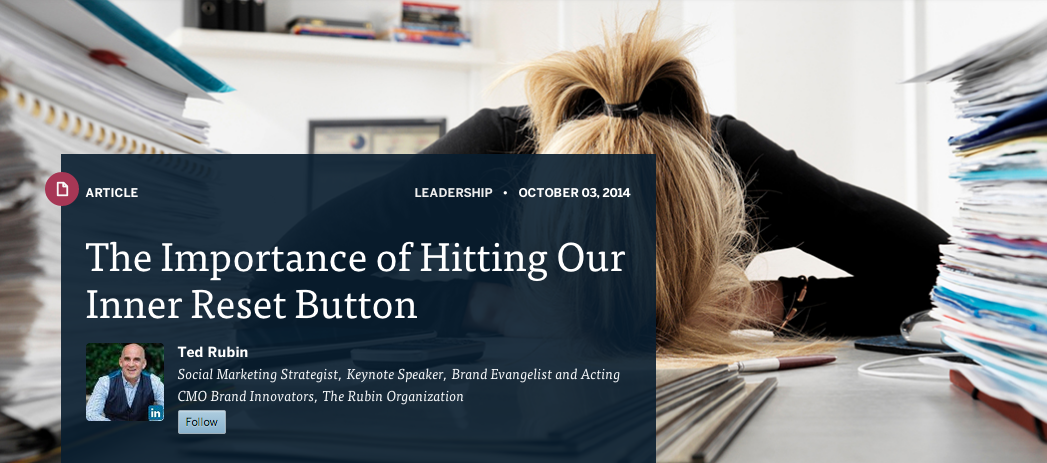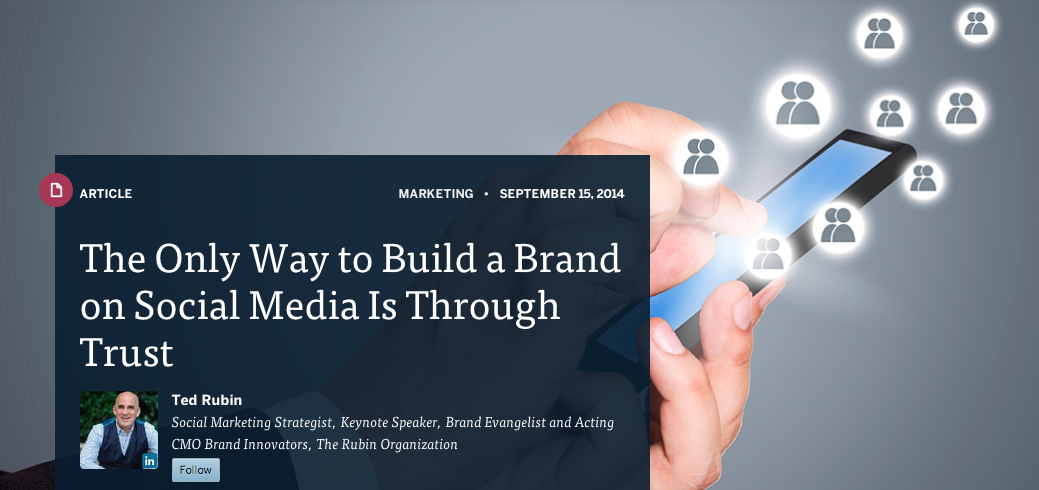——-
Our brains process five times the information they did 20 years ago. Here’s how you can help your brain adapt to information overload, and remain creative and productive.
Here’s a question for you: How many of the following scenarios can you identify with?
- I feel guilty when I’m not working.
- I often pull all-nighters on projects but don’t get as far as I should on them.
- I feel the need to prop up my idea-flow with caffeine.
- I check my email even on my days off and during vacation.
- Doing what I’m doing used to be fun—now it’s difficult to stay energized.
- I’m less organized than I used to be and find myself procrastinating more.
- I often wake up in the middle of the night with anxiety.
- I pick up colds and flu very easily.
If it seems you’re busier than ever, yet struggle with productivity—and one or more of the above scenarios sounds awfully familiar—you’re not alone. Today we’re more plugged in than ever before in history, and we’re paying a price—mental, emotional and physical burnout.
Balancing Act
We have more difficulty staying focused. We have trouble disengaging from work. We experience more stress-related health problems. In an INSEAD research paper,“Doing Nothing and Nothing to Do: The Hidden Value of Empty Time and Boredom,”author Manfred F.R. Kets de Vries writes: “The ability to balance activity and solitude, noise and quietness, is an excellent means to tap our inner creative resources. The secret of truly successful, creative people may well be that they learned very early in life how not to be busy.”
Does this mean you should chuck work and “Zen” your way to success? Of course not. But there’s a critical balance that seems to be missing from our lives, especially if we have a tendency to be workaholics.
Information Overload
Every day, we take in about 174 newspapers’ worth of information (five times as much as we did 20 years ago), and watch an average of five hours of TV. That’s a lot to process, and our brains have a hard time taking it all in. On top of that, thanks to our plugged-in lifestyle, we take less true vacation time and work more hours—neither of which helps us be more productive.
I read an interesting article in The New York Times Sunday Review recently called“Hit the Reset Button in Your Brain.” The article was written by Daniel J. Levitin, author of The Organized Mind: Thinking Straight in the Age of Information Overload, which explains that the human brain has evolved into two separate “attention” systems that help us sift through information and sort it into two areas: the task-positive and task-negative networks.
The task-positive network is active when you’re focused on a specific task and engaged in it without distraction. The task-negative network, on the other hand, is active when your mind is wandering or daydreaming. That’s where inspiration and creativity come from. Then there’s a third component, an attention filter, which acts like a switch between the task-positive and task-negative networks. The filter helps orient us and tells us what to pay attention and what to ignore in any given moment.
Over the years, we’ve developed shorter attention spans because we’re constantly being bombarded by incoming information, which, in effect, activates that switch. So if you’re constantly getting notifications for email, Facebook, Twitter, etc., you’re constantly see-sawing back and forth too often between what’s critical and what’s not.
Deliberate Immersion
Levitin suggests we need to lay off that switch by segmenting our daily activities into time slots and immersing ourselves in a single task for a sustained period, like 30 to 50 minutes without distractions. The same goes for immersing ourselves in task-negative activities like exercise, walking in the woods or listening to music, which all help trigger the mind-wandering, daydreaming mode that leads to creativity and resets our brain to provide perspective on what we’re doing.
Chances are, you’ll have to train yourself to do this; however, regular bouts of downtime where you’re not constantly plugged into task-positive activities is not only good for the brain, it’s good for your body, too. The same can be said for taking real vacations (not working during your holidays). I know that taking frequent breaks and putting myself in the moment when I’m on a holiday really helps me focus and also creates a more positive frame of mind when I’m back at work.
The human brain is a marvel of creation. When we treat it right and stop abusing it, wonderful things can happen. If we all hit our “reset” button more deliberately and more often, just think of what we could accomplish together.
Photo: Getty Images
Originally posted OCTOBER 3, 2014 American Express OPEN Forum







